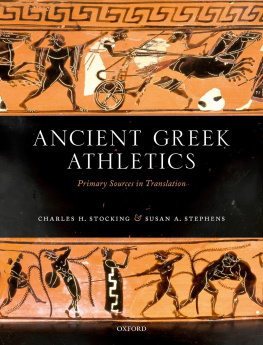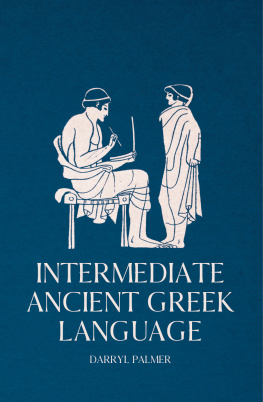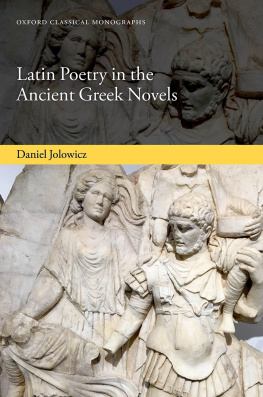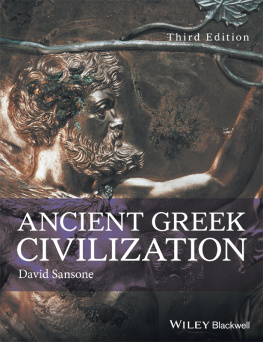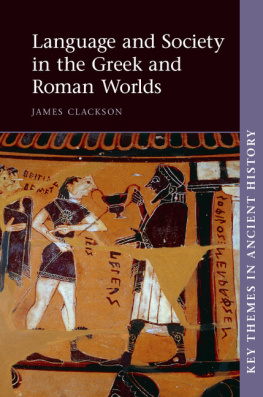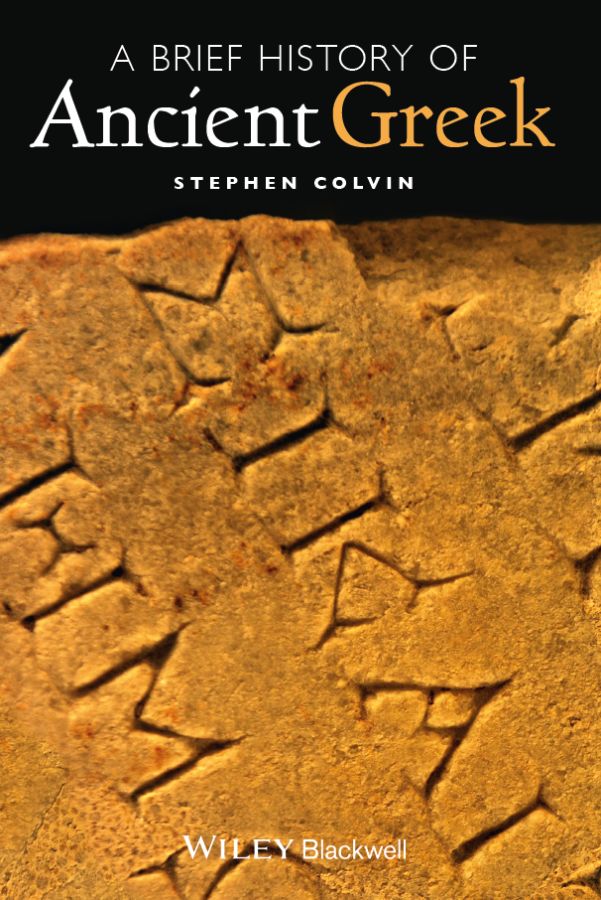
Brief Histories of the Ancient World
This series offers concise, accessible, and lively accounts of central aspects of the ancient world. Each book is written by an acknowledged expert in the field and provides a compelling overview, for readers new to the subject and specialists alike.
Published
A Brief History of Ancient Astrology
Roger Beck
A Brief History of the Olympic Games
David C. Young
A Brief History of Ancient Greek
Stephen Colvin
In Preparation
A Brief History of Roman Law
Jill Harries

This edition first published 2014
2014 Stephen Colvin
Registered Office
John Wiley & Sons, Ltd, The Atrium, Southern Gate, Chichester, West Sussex, PO19 8SQ, UK
Editorial Offices
350 Main Street, Malden, MA 02148-5020, USA
9600 Garsington Road, Oxford, OX4 2DQ, UK
The Atrium, Southern Gate, Chichester, West Sussex, PO19 8SQ, UK
For details of our global editorial offices, for customer services, and for information about how to apply for permission to reuse the copyright material in this book please see our website at www.wiley.com/wiley-blackwell .
The right of Stephen Colvin to be identified as the author of this work has been asserted in accordance with the UK Copyright, Designs and Patents Act 1988.
All rights reserved. No part of this publication may be reproduced, stored in a retrieval system, or transmitted, in any form or by any means, electronic, mechanical, photocopying, recording or otherwise, except as permitted by the UK Copyright, Designs and Patents Act 1988, without the prior permission of the publisher.
Wiley also publishes its books in a variety of electronic formats. Some content that appears in print may not be available in electronic books.
Designations used by companies to distinguish their products are often claimed as trademarks. All brand names and product names used in this book are trade names, service marks, trademarks or registered trademarks of their respective owners. The publisher is not associated with any product or vendor mentioned in this book.
Limit of Liability/Disclaimer of Warranty: While the publisher and author have used their best efforts in preparing this book, they make no representations or warranties with respect to the accuracy or completeness of the contents of this book and specifically disclaim any implied warranties of merchantability or fitness for a particular purpose. It is sold on the understanding that the publisher is not engaged in rendering professional services and neither the publisher nor the author shall be liable for damages arising herefrom. If professional advice or other expert assistance is required, the services of a competent professional should be sought.
Library of Congress Cataloging-in-Publication Data
Colvin, Stephen.
A brief history of ancient Greek / Stephen Colvin. First Edition.
pages cm. (Wiley Brief histories of the ancient world)
Includes bibliographical references and index.
ISBN 978-1-4051-4925-9 (hardback)
1. Greek languageHistory. 2. Greek language, Hellenistic (300 B.C.600 A.D.) I. Title.
PA227.C56 2014
480.09dc23
2013028400
A catalogue record for this book is available from the British Library.
Cover image: Marble inscription from Pergamon Museum, Berlin. Photo PRISMA ARCHIVO / Alamy.
Cover design by Richard Boxall Design Associates
List of Figures
Family tree of the Indo-European languages |
Linear B syllabary |
Linear B tablet: Pylos Cn 608 |
Ox head to alf |
Timotheos papyrus with koronis |
Map of the Greek dialects around 500 BC |
Preface and Acknowledgments
All languages are, of course, equally old: what sets Greek apart from most other languages (apart from Chinese) is that (a) it has been recorded in alphabetic writing continuously for over 2800 years (and there is in addition a brief attestation in Mycenean syllabic script from around 600 years earlier); and (b) it has kept its identity as Greek for most of that period. Latin would have a written history of around 2300 years if one included the modern Romance languages in the calculation; but Latin changed both name and cultural identity when it became known as Italian, Spanish, French, etc. If the territories of the Hellenistic empire of Alexander the Great and his successors had remained Greek-speaking, as those of the Roman empire in the West mostly remained Latin-speaking (with the exception of North Africa, and, for a time, the Iberian peninsula), it is likely that a number of competing Hellenic vernaculars would have emerged, and there would thus be not one but several Greek languages, some or all of which might have been renamed by speakers anxious to carve out separate national identities. The modern Cypriot dialect is about as distinct from standard Greek as the Spanish of Madrid is from the Italian of Florence; but Cypriots are taught standard Greek in school, and it is used in most printed material, so that there is constant pressure in the direction of the standard. In situations where such political, ideological, and cultural pressure does not exist, a new language emerges.
In the classical tradition in the West it is customary to use the term Greek to mean ancient Greek, and to use the qualifier modern Greek where necessary. Greeks do exactly the reverse for obvious reasons, thus Greek and ancient Greek. In this book the term Greek will refer to whichever period is under discussion in the chapter in question (modifiers are used if there is a risk of ambiguity). Greek words are transliterated and translated (longer passages are translated only): transliteration of ancient Greek gives vowel length, but not the ancient pitch accent; transliteration of modern Greek gives the modern stress accent. Transliteration of Greek names follows the inconsistent but widely adopted mixed system: familiar figures are given in their traditional Latin version (Aeschylus not Aiskhylos), and others are transliterated directly from the Greek (Alkaios).
Greek and Latin are the two classical languages of European culture; and since this is a book about language we can start off at once by looking at this word. They are classical because they are traditionally the languages learned in class: this is a late meaning, from French, which connects the adjective classique with the word classe class. They are also classical because they belong to the highest rank, are of the first order: this is the meaning of the rare Latin word classicus, which is merely an adjective derived from the noun classis, group, class (originally called-up group, levy, from the Indo-European root which also gave the Greek kale, I call). The Latin adjective denoted citizens of the top social class, and was not metaphorically extended to writers, let alone languages, until very late. It may seem odd to start a book on the history of Greek with a discussion of a Latin word: but it is an appropriate reminder that the two languages became quite intertwined (reflecting the interaction of the two civilizations), and penetrate the languages of Europe at every level and in every conceivable way.
For example, English has Greek words which were (a) borrowed into Germanic (
Next page

